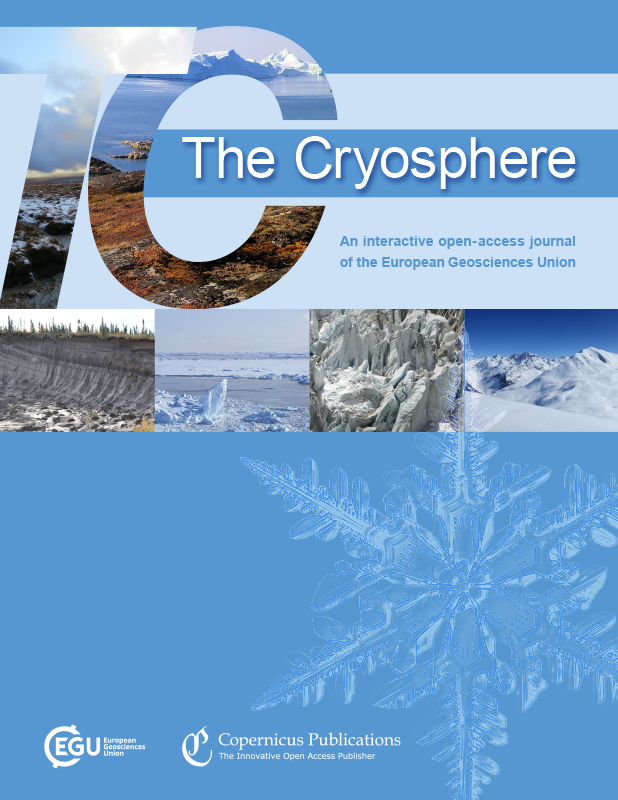芬兰西北部两个监测的palsa沼泽的永久冻土退化
IF 4.4
2区 地球科学
Q1 GEOGRAPHY, PHYSICAL
引用次数: 2
摘要
摘要包括芬兰拉普兰在内的许多地区预计将会消失沼泽和泥炭高原。然而,关于palsas降解过程的详细的长期监测数据很少。在这里,我们展示了位于芬兰西北部的两个palsa站点(Peera和Laassaniemi, 68°N)的航空摄影时间序列分析(1959-2021)、年度实时运动学(RTK) GNSS和有源层监测(2007-2021)和年度无人航空系统调查(2016-2021)的结果。利用线性回归分析了棕丛退化的时间趋势及其与气候的关系。在这两个地点,自1959年以来,palsa面积减少了- 77%至- 90%,高度自2007年以来减少了- 16%至- 49%,这表明在整个研究期间,永久冻土发生了实质性的退化。面积损失率主要与Peera的冬季气温变化和Laassaniemi的冬季降水变化有关。活动层厚度(ALT)在2007 - 2021年间呈逐年变化趋势,主要与夏季极暖日数、往年秋季降雨量和Peera积雪深度有关。在Laassaniemi,尽管palsa体积持续减少,但palsa中部的ALT与气候的相关性较弱,近8年来一直呈下降趋势。我们的研究结果表明,palsas内部的ALT不一定反映总体永久冻土条件,并强调了地表位置监测与活动层测量的重要性。ALT与积雪的发生呈负相关,说明黄土高原气候-冻土反馈的复杂性。本文章由计算机程序翻译,如有差异,请以英文原文为准。
Permafrost degradation at two monitored palsa mires in north-west Finland
Abstract. Palsas and peat plateaus are expected to disappear from many regions, including Finnish Lapland. However, detailed long-term monitoring data of the degradation process on palsas are scarce. Here, we present the results of the aerial photography time series analysis (1959–2021), annual real-time kinematic (RTK) GNSS and active layer monitoring (2007–2021), and annual unoccupied aerial system surveys (2016–2021) at two palsa sites (Peera and Laassaniemi, 68∘ N) located in north-west Finland. We analysed temporal trends of palsa degradation and their relation to climate using linear regression. At both sites, the decrease in palsa area by −77 % to −90 % since 1959 and height by −16 % to −49 % since 2007 indicate substantial permafrost degradation throughout the study periods. The area loss rates are mainly connected to winter air temperature changes at Peera and winter precipitation changes at Laassaniemi. The active layer thickness (ALT) has varied annually between 2007 and 2021 with no significant trend and is related mainly to the number of very warm days during summer, autumn rainfall of previous year, and snow depths at Peera. At Laassaniemi, the ALT is weakly related to climate and has been decreasing in the middle part of the palsa during the past 8 years despite the continuous decrease in palsa volume. Our findings imply that the ALT in the inner parts of palsas do not necessarily reflect the overall permafrost conditions and underline the importance of surface position monitoring alongside the active layer measurements. The results also showed a negative relationship between the ALT and snow cover onset, indicating the complexity of climate–permafrost feedbacks in palsa mires.
求助全文
通过发布文献求助,成功后即可免费获取论文全文。
去求助
来源期刊

Cryosphere
GEOGRAPHY, PHYSICAL-GEOSCIENCES, MULTIDISCIPLINARY
CiteScore
8.70
自引率
17.30%
发文量
240
审稿时长
4-8 weeks
期刊介绍:
The Cryosphere (TC) is a not-for-profit international scientific journal dedicated to the publication and discussion of research articles, short communications, and review papers on all aspects of frozen water and ground on Earth and on other planetary bodies.
The main subject areas are the following:
ice sheets and glaciers;
planetary ice bodies;
permafrost and seasonally frozen ground;
seasonal snow cover;
sea ice;
river and lake ice;
remote sensing, numerical modelling, in situ and laboratory studies of the above and including studies of the interaction of the cryosphere with the rest of the climate system.
 求助内容:
求助内容: 应助结果提醒方式:
应助结果提醒方式:


